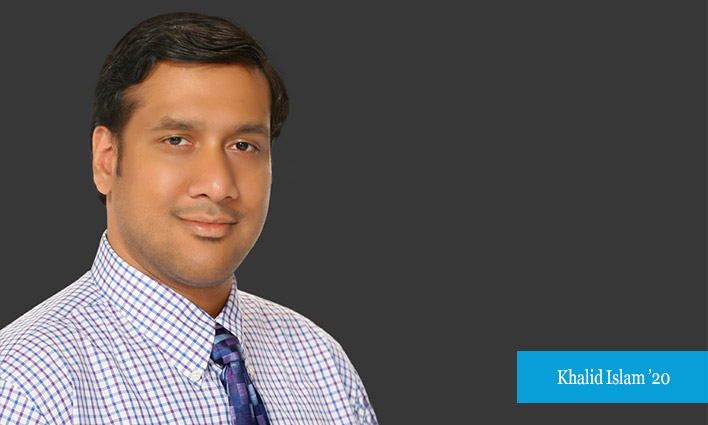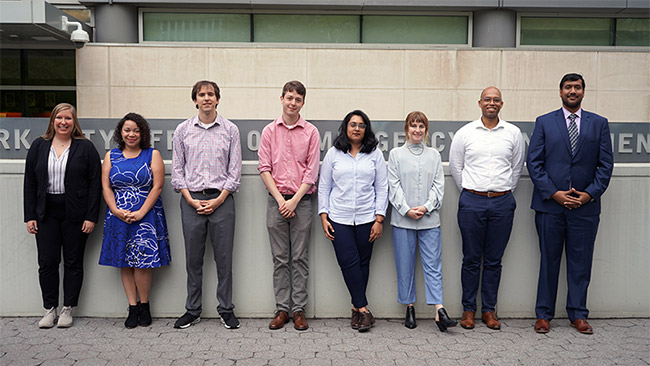
Khalid Islam’s steadfast commitment to public service comes naturally to him. “I’ve always been around people who have dedicated their lives to public service,” says Islam ’20, a longtime New York City paramedic pursuing his master’s degree in Emergency Management at John Jay. “My grandfather served as a diplomat in Bangladesh; my father worked as a pediatrician helping low-income families; and both my mother and my wife are teachers.” So, when he was named a John D. Solomon Fellow for Public Service he couldn’t help but think of his family and feel honored by the recognition.
“What drives me to keep learning and evolving my skills in this field is the belief that public service benefits the whole community.” —Khalid Islam
The highly sought–after program was established by the family of journalist and devoted public servant, John D. Solomon, and is the first student fellowship devoted specifically to emergency management. Through the program, Islam works with the New York City Emergency Management’s Training, Exercises and Emergency Operations Center (EOC) Unit, the agency responsible for coordinating citywide emergency planning and response for all types of emergencies. “I’m getting hands-on, on-the-ground experience at the EOC working on projects, using my paramedic background to provide insight on drill design, and collaborating with an incredible group of people,” says Islam. “What drives me to keep learning and evolving my skills in this field is the belief that public service benefits the whole community—that’s something my parents instilled in me from an early age. Growing up, they’d say, ‘whatever profession you choose, make sure you can help the greatest amount of people; affect them in a good way.’ And that’s what I’m trying to do.”

Creating His Own Path
Born in Saudi Arabia, Islam and his family moved to the suburbs of Philadelphia when he was two years old. “I had a fairly normal childhood,” he recalls. “But in high school, after 9/11, there was a change. Suddenly, my identity came to forefront and into question, and while no violent acts were committed against me, there was some hostility.” Moving to New York City to pursue his undergraduate degree, Islam found himself in a city that celebrated diversity. “It was an eye-opening experience for me in so many ways,” he says. “I instantly felt at home in New York. I was interacting with people from all different cultures and socioeconomic backgrounds.” The move also provided Islam with a chance to enter public service at an early age. Putting college on hold, he became a certified New York State emergency medical technician (EMT), and was hired into the New York City 911/Emergency Medical Services (EMS) system working as a paramedic in all five New York City boroughs. “I initially had plans to go to medical school and be a doctor like my father, but at the time I didn’t have the discipline to pursue that,” admits Islam, who credits his 13-plus years with EMS for his growth. “It shaped me into the adult I am today. When you work with EMS you have to really listen and have compassion for others; you have to work within a structure in a fast-paced environment; and you have to think fast and be assertive.”
His EMS experience led to unexpected but welcomed teaching opportunities within the City University of New York (CUNY) system, working at Kingsborough Community College, Borough of Manhattan Community College, and LaGuardia Community College. “Part of being an EMT in New York is that you’re expected to train students, and during that experience I realized I really enjoy the teaching process. So, when Kingsborough established a paramedic program around six years ago, and they needed someone to run the simulation lab, I was fortunate to come in at the ground level.” Preparing himself to teach the next generation of paramedics, Islam committed himself to learning all about simulation technology and education, even earning his teaching certification from New York State along the way. “It was a great opportunity for me to step into the field of education not only as an instructor, but as a student as well,” he says, adding that he was inspired by the experience to finish his bachelor’s degree and pursue a master’s degree.

Coming to John Jay
At John Jay, Islam is on his way to earning a master’s degree in Emergency Management, with the goal of expanding his technical skill set and strengthening his ability to communicate effectively with policy makers in the field. “John Jay is synonymous with public service. When you work in the city and engage in conversations with police officers, firefighters, or other emergency service personnel, they all say John Jay is the institution to go to,” says Islam, explaining why he chose the College. “John Jay has a real understanding of what public servants go through and what they need to thrive in their careers.” Enrolling in the College’s online-based program, Islam gained insight into the world of emergency management. “The program provided me with the foundational core structures and values of emergency management. It’s been great because it ties all my experiences on the field, at the fellowship, and in the classroom together. Now, I’m able to see how the dots connect, and I’m getting the tools I need to develop professionally,” he explains.
“John Jay has a real understanding of what public servants go through and what they need to thrive in their careers.” —Khalid Islam
Using the knowledge and skills acquired in the classroom, Islam has been able to apply them to various work projects, making him an integral asset to every team he’s on. “I’m working in a manager role at an ambulance agency in one of the top health systems in the city and I’ve been able to put this knowledge into use in real time,” he explains. “For instance, I took a Geographical Information Systems class where I learned the software that helps you create maps with relevant real-world data. And I’ve been able to use it at the ambulance agency where I monitor 19 ambulances and 230 employees across three boroughs.”
His time at John Jay also helped Islam narrow down where in emergency management he’d like to go next. “I would love to grow in the emergency management sector within the health care community,” he says. “My goal is to be at the forefront of redefining what EMS can be, using data to improve training, and truly using the full potential of paramedics and EMTs in the field by expanding their roles and responsibilities. EMS is a relatively young field, so to be able to shape the industry and culture, and make it so everyone is performing at their best, and thereby helping the greatest number of people, is something I can see myself doing for the rest of my life.”



